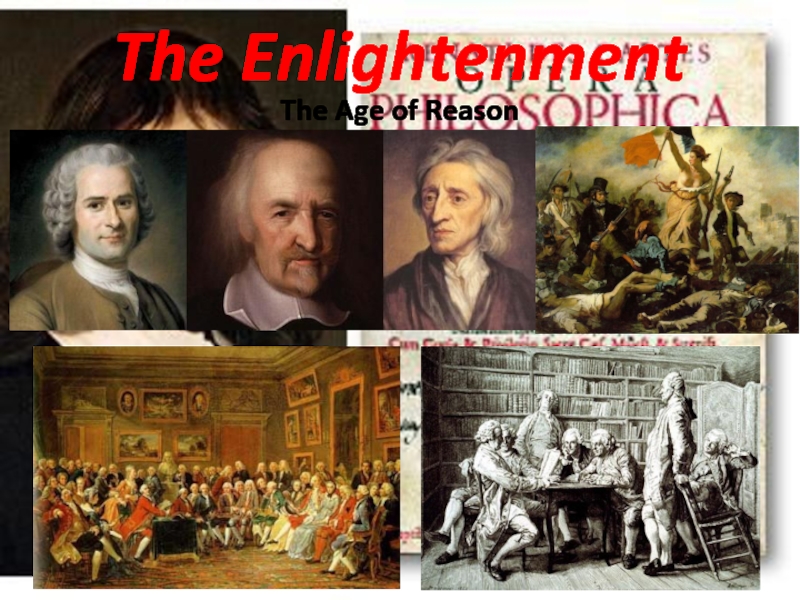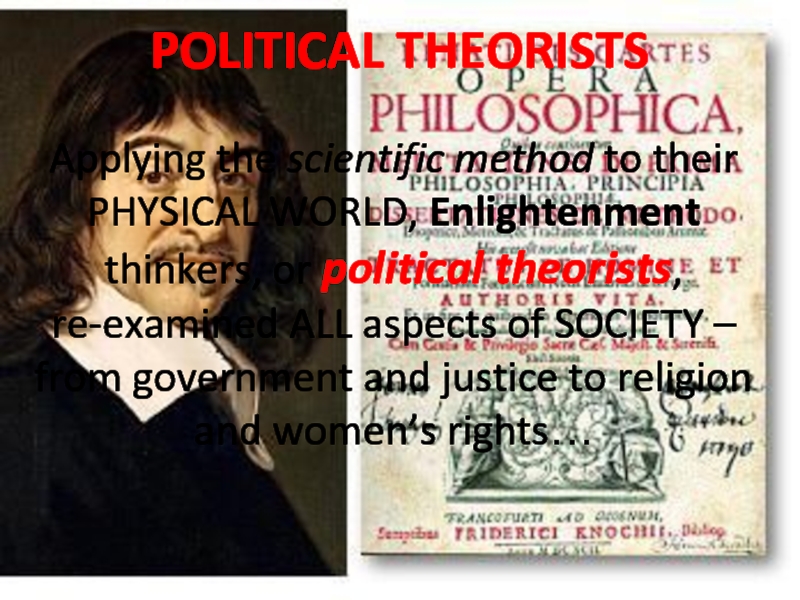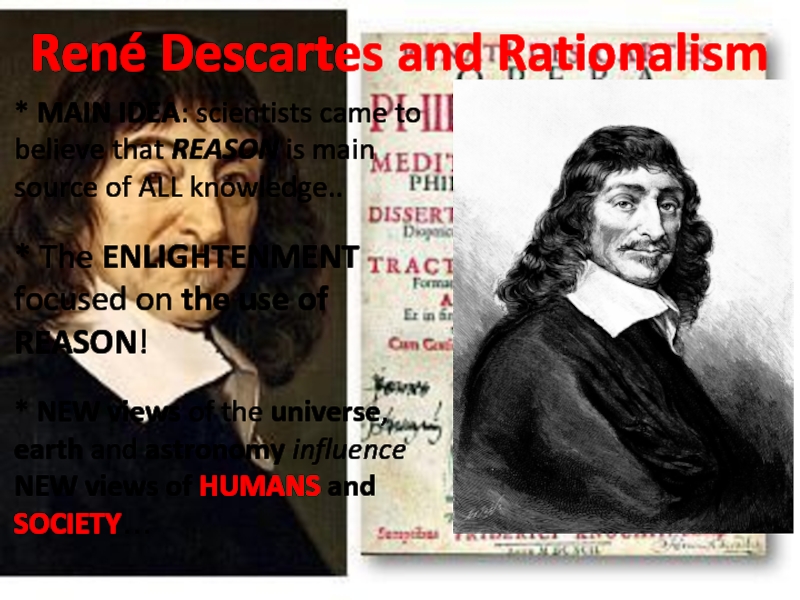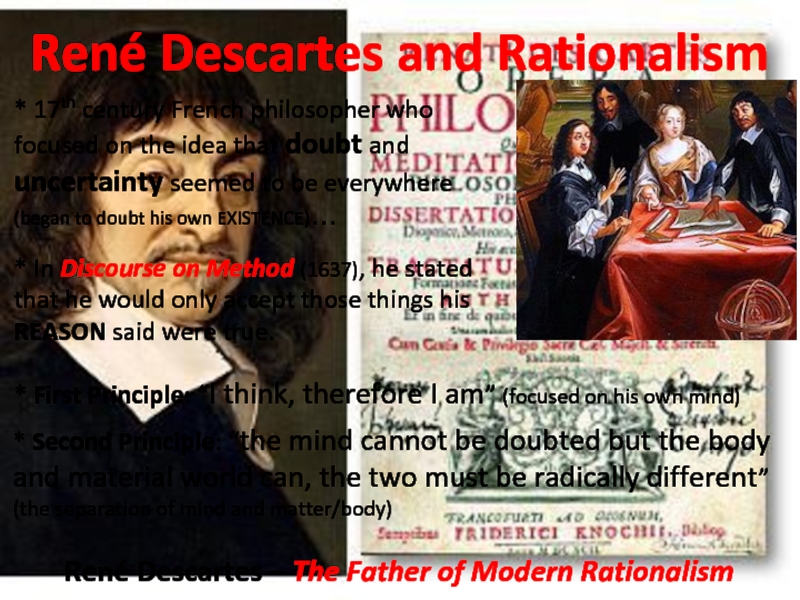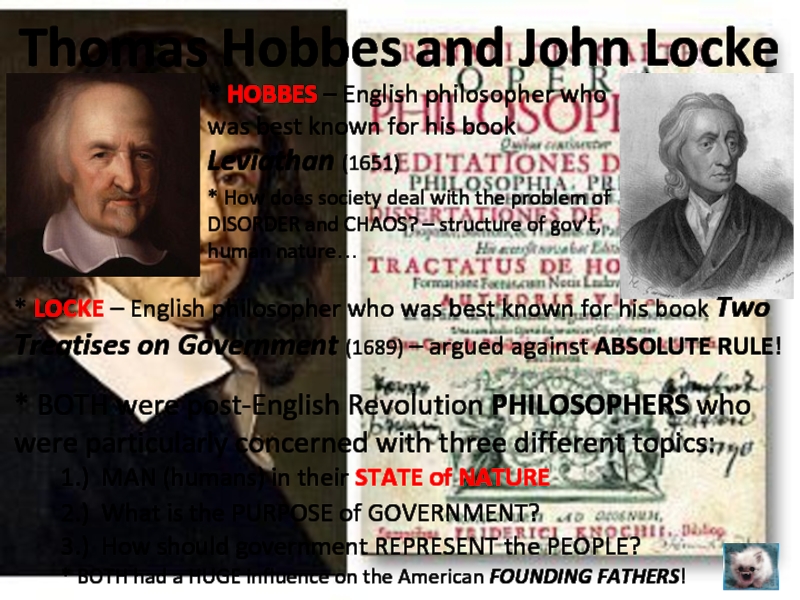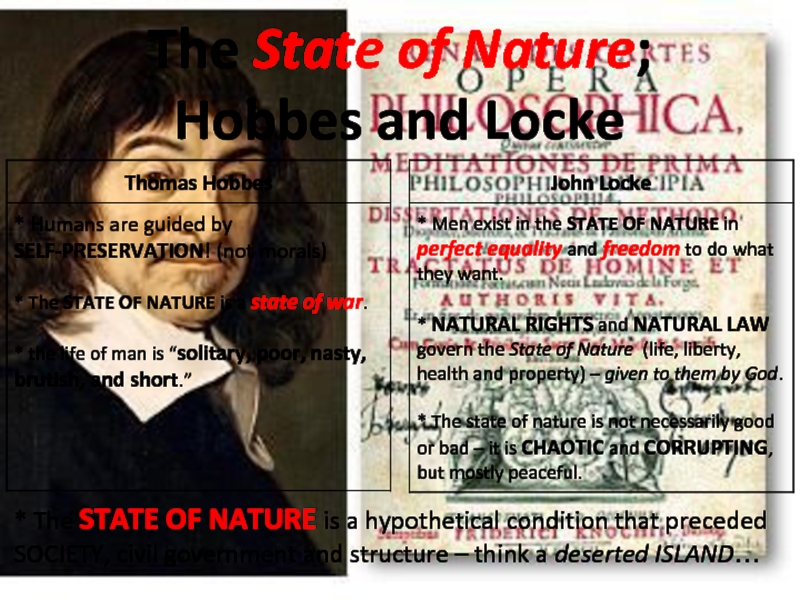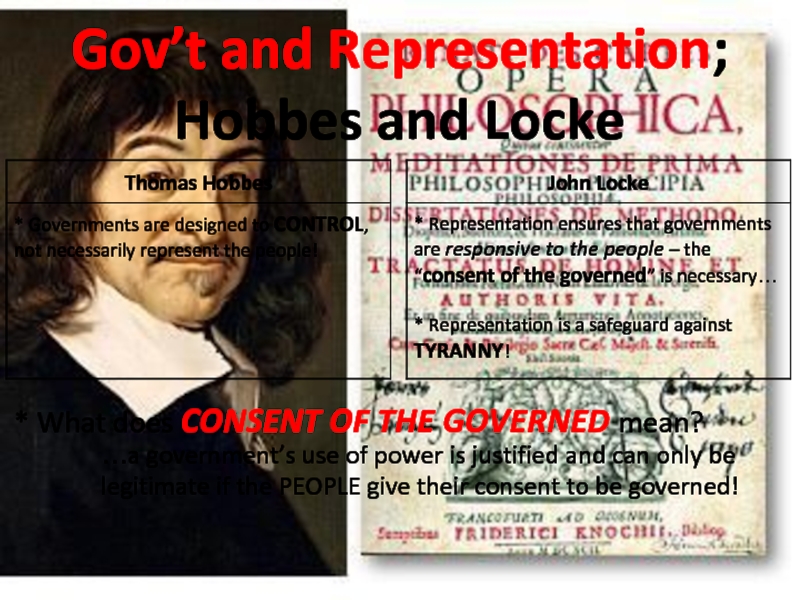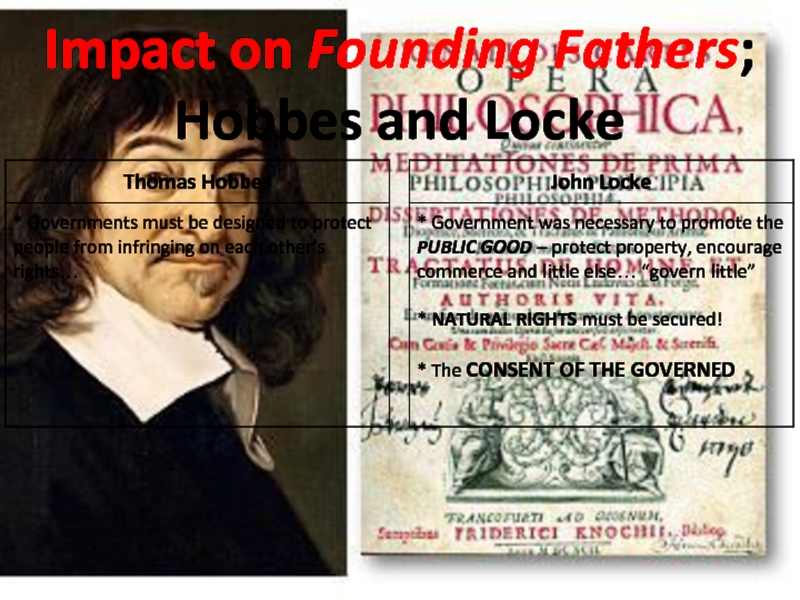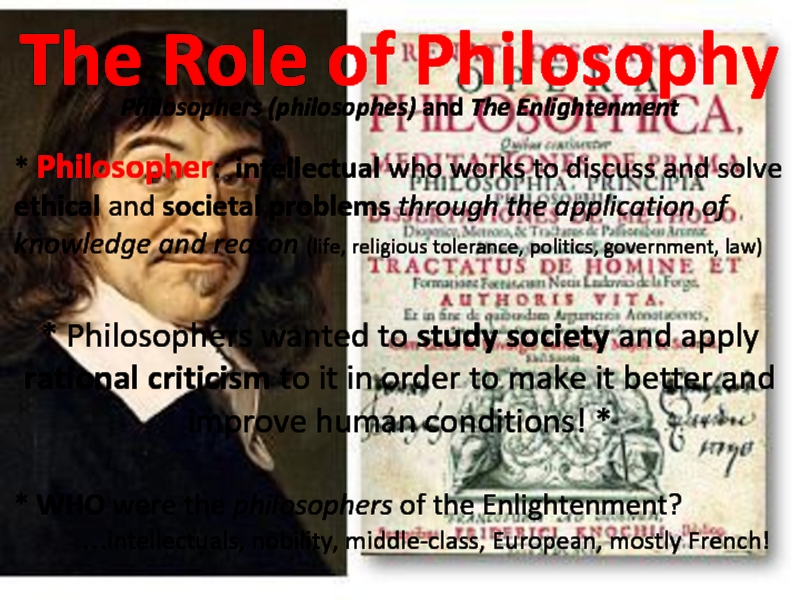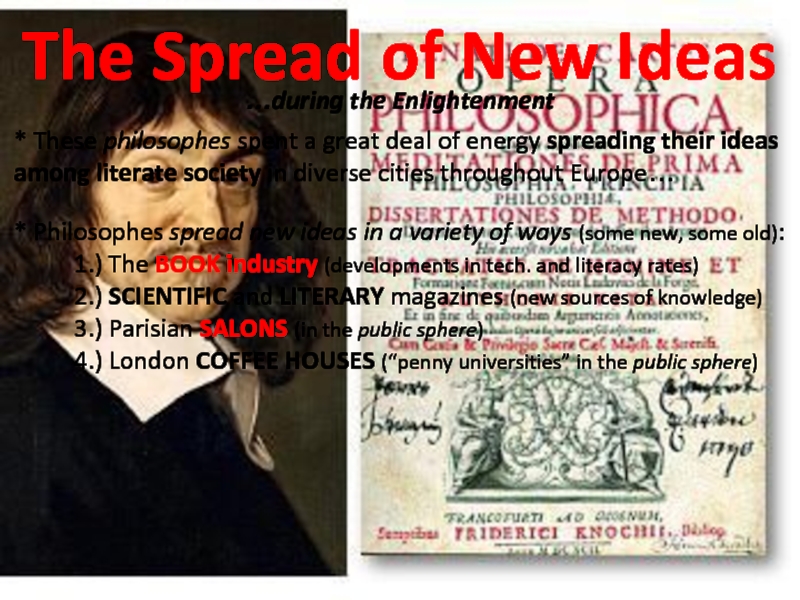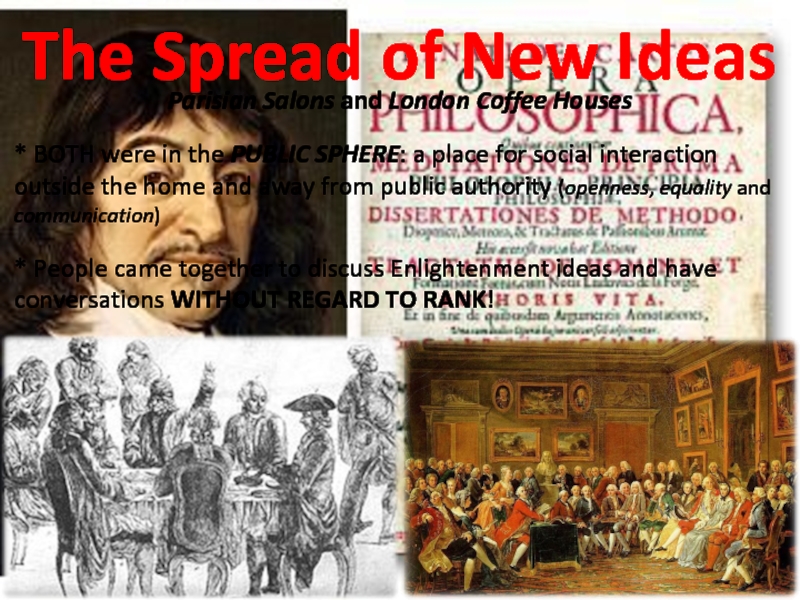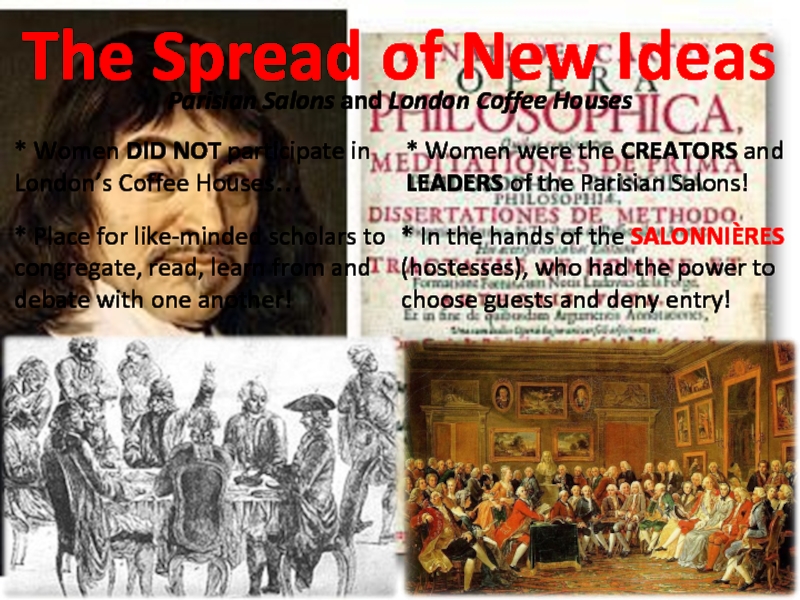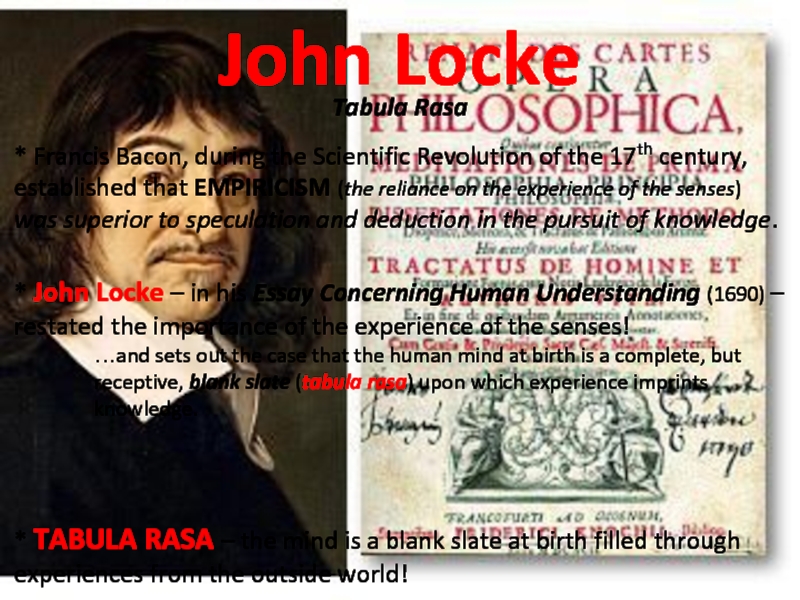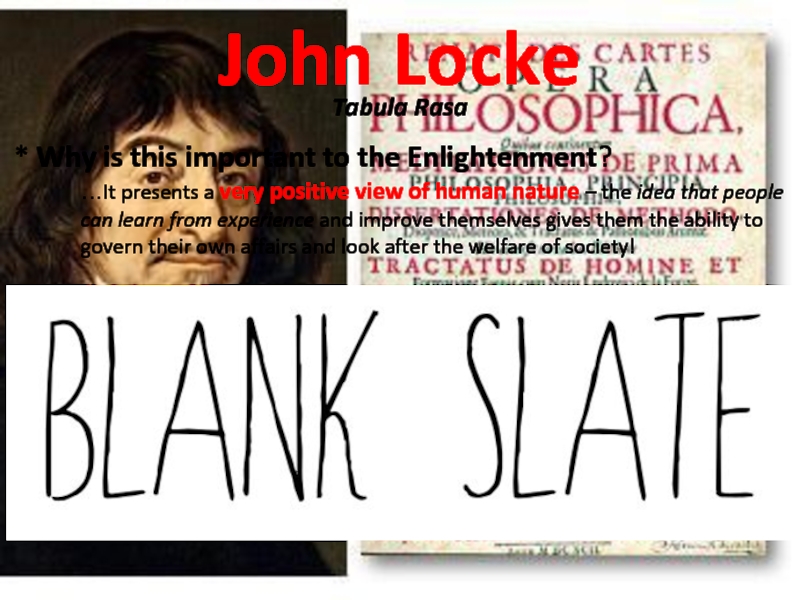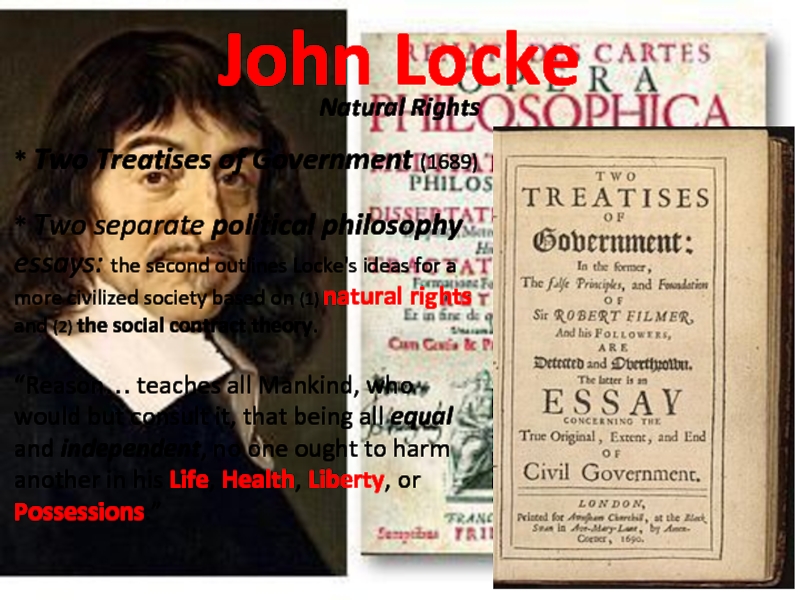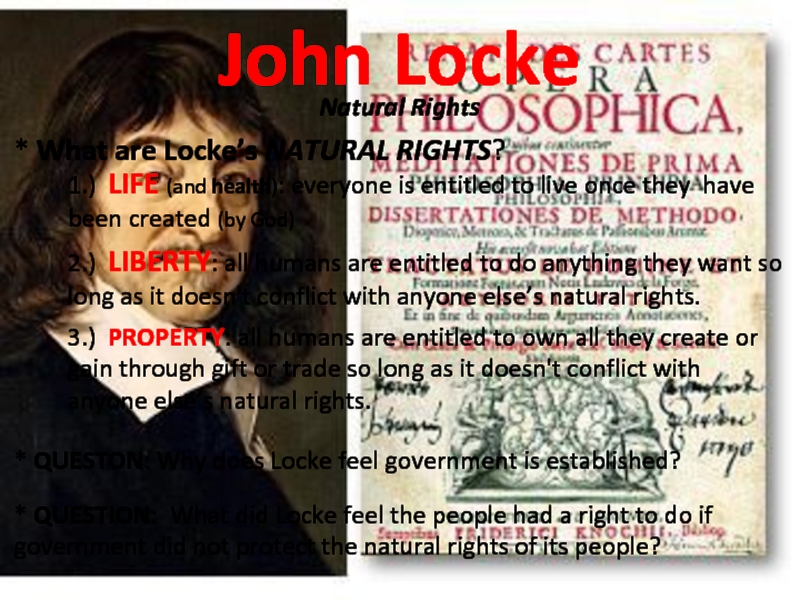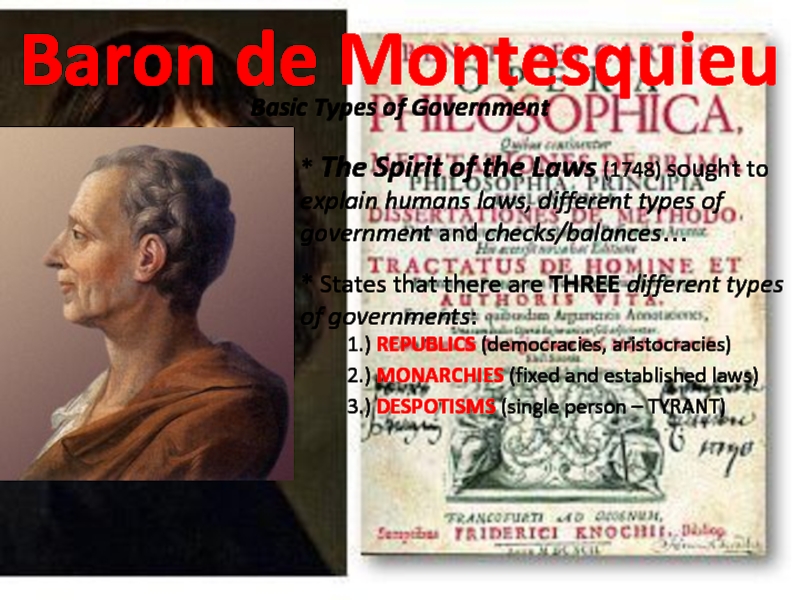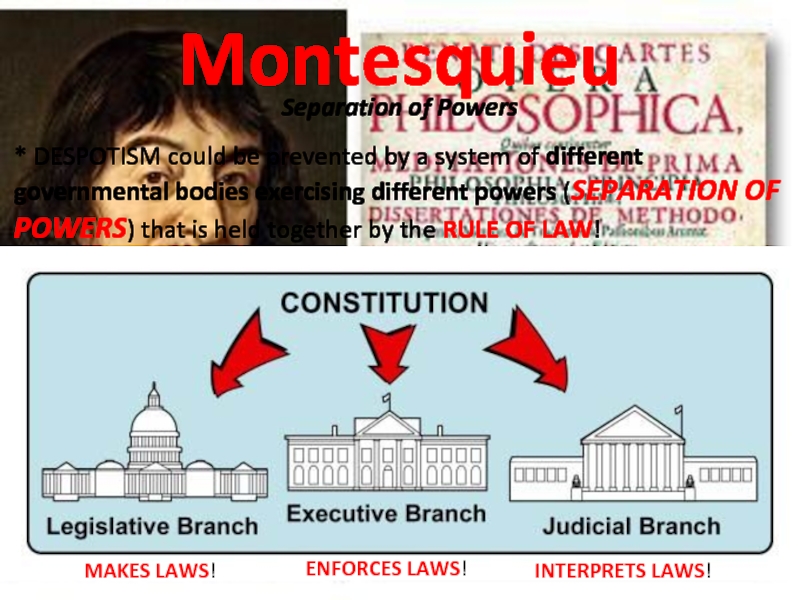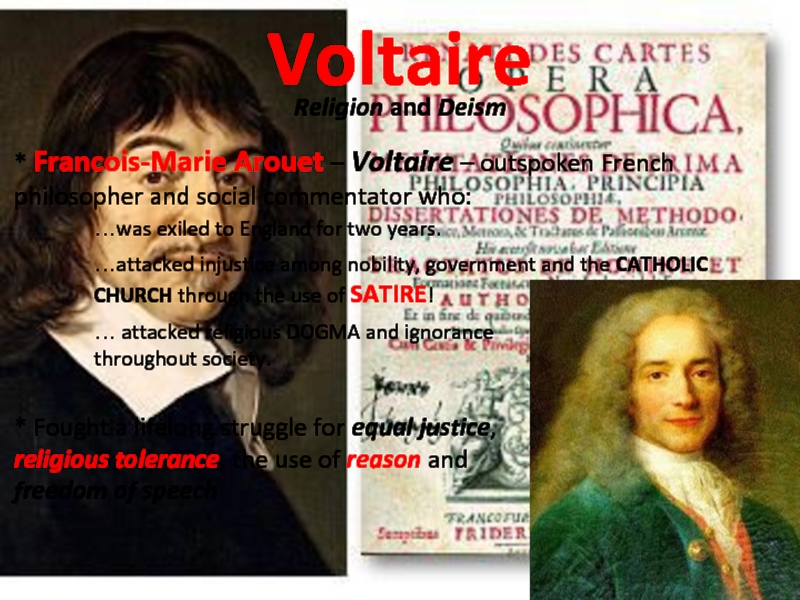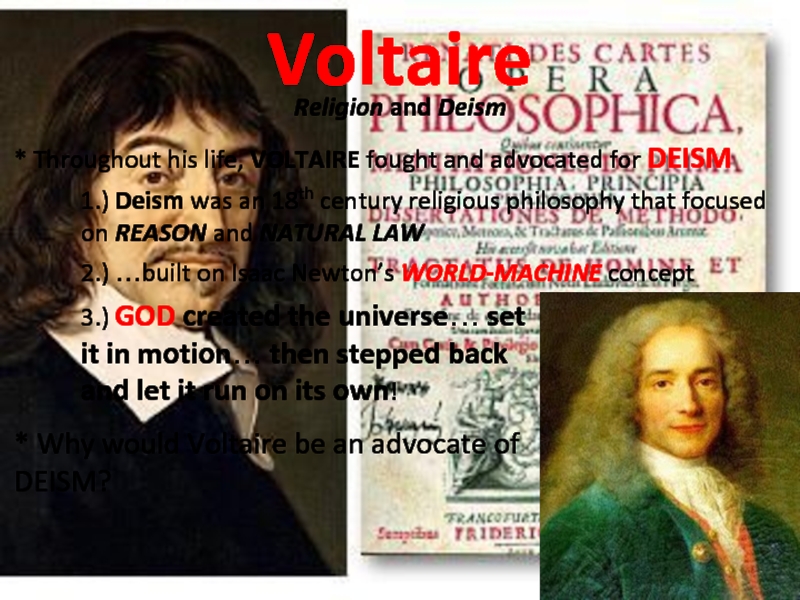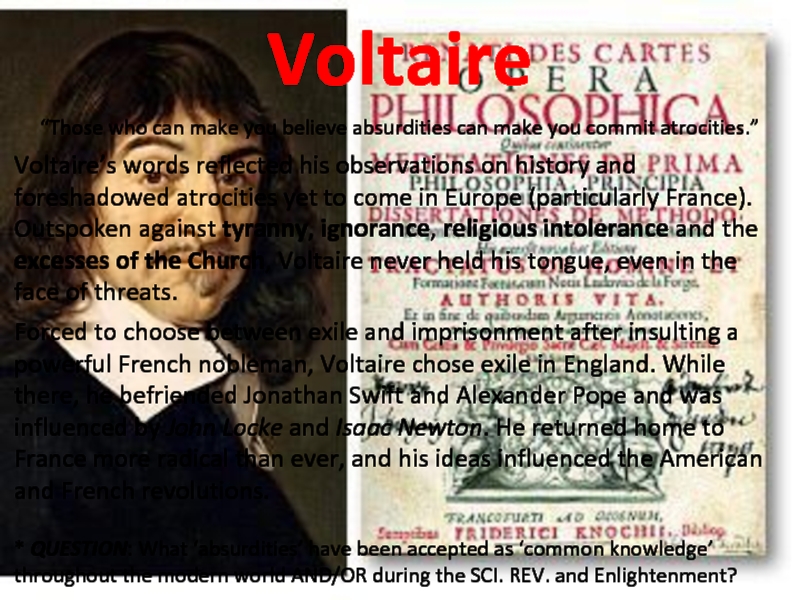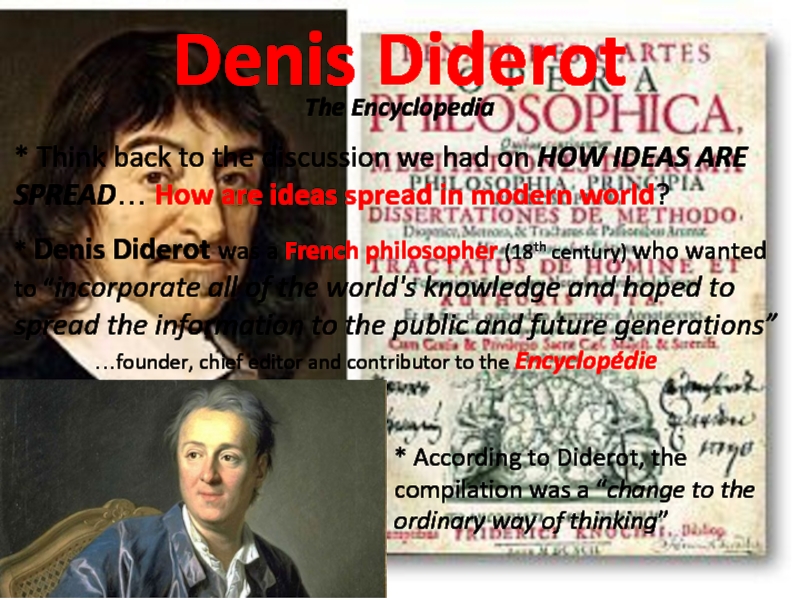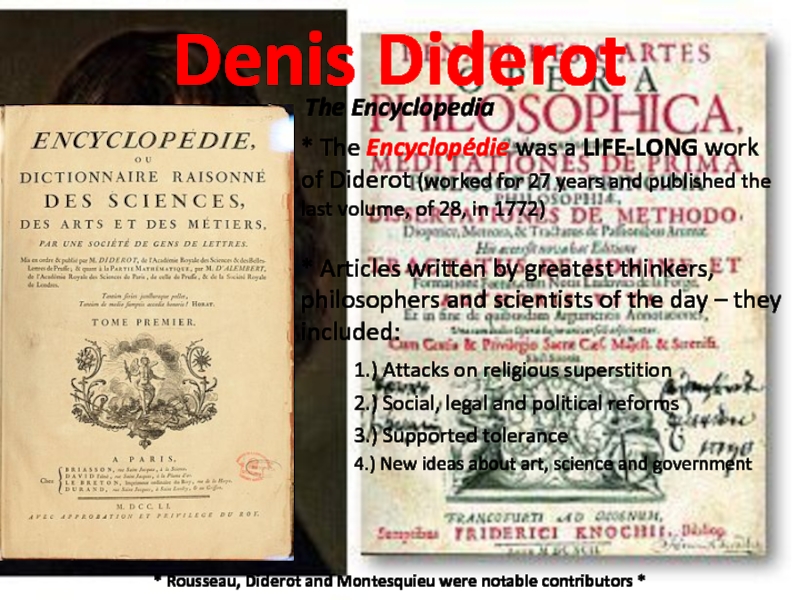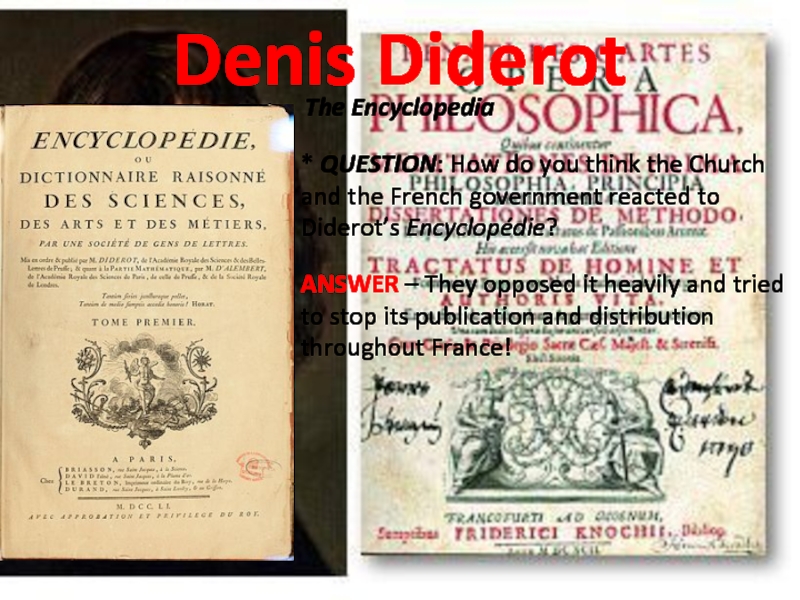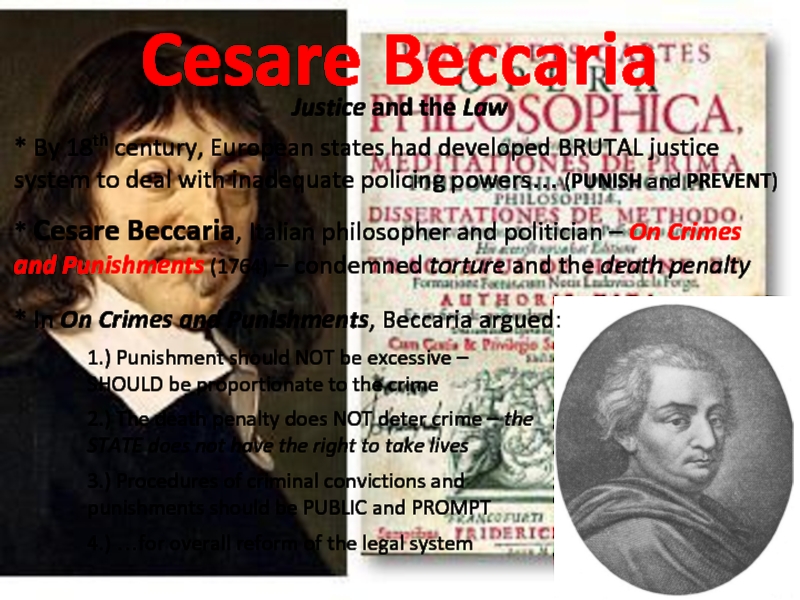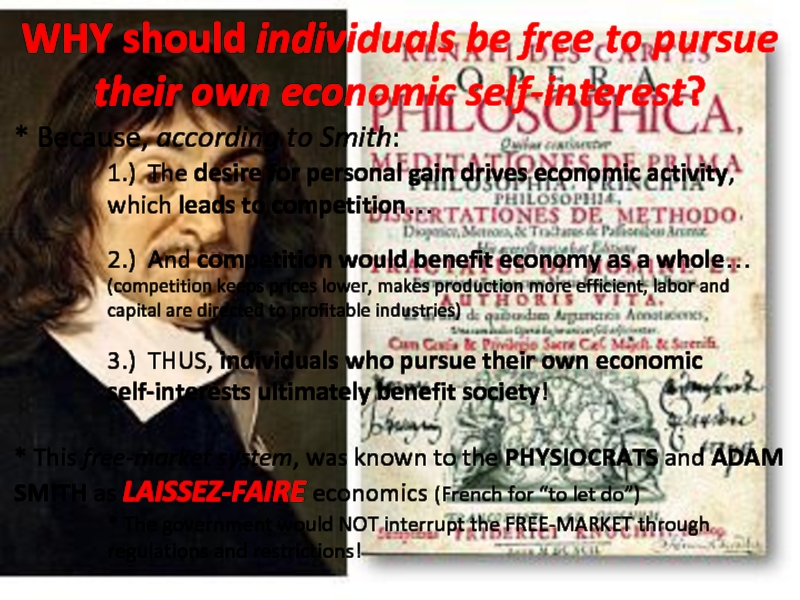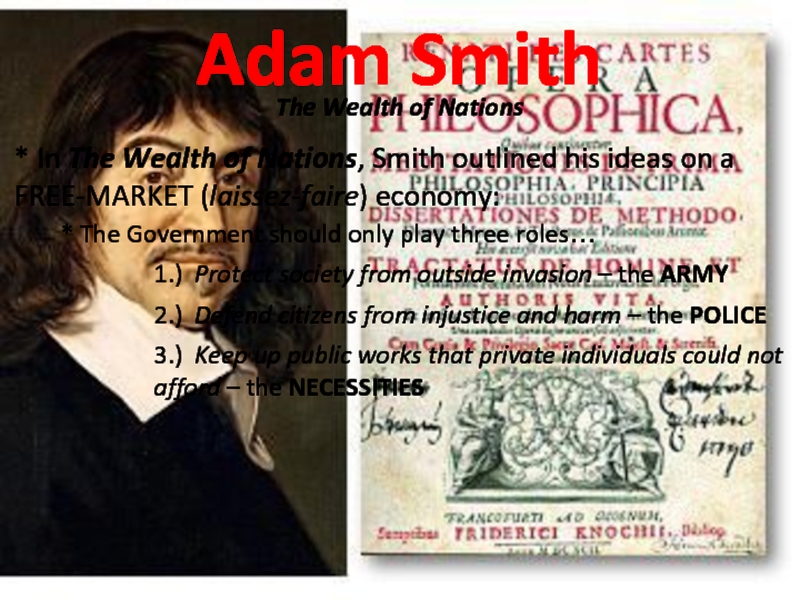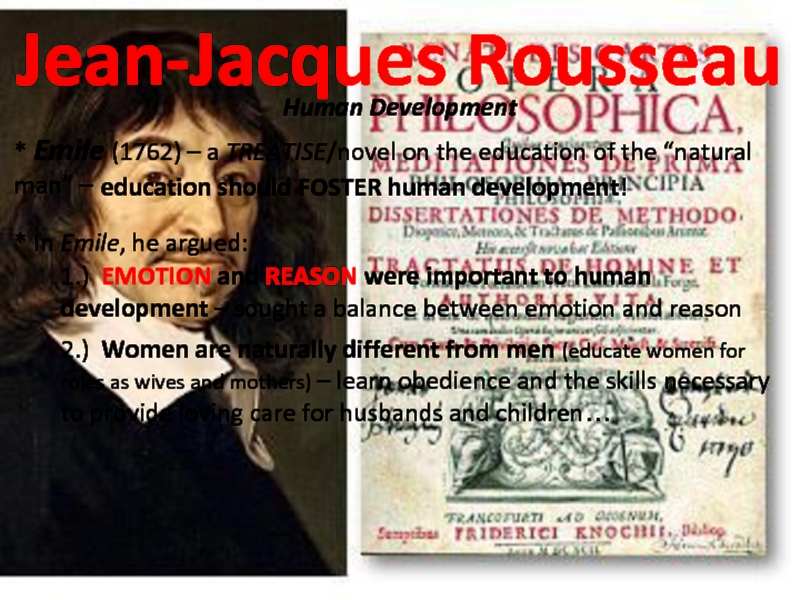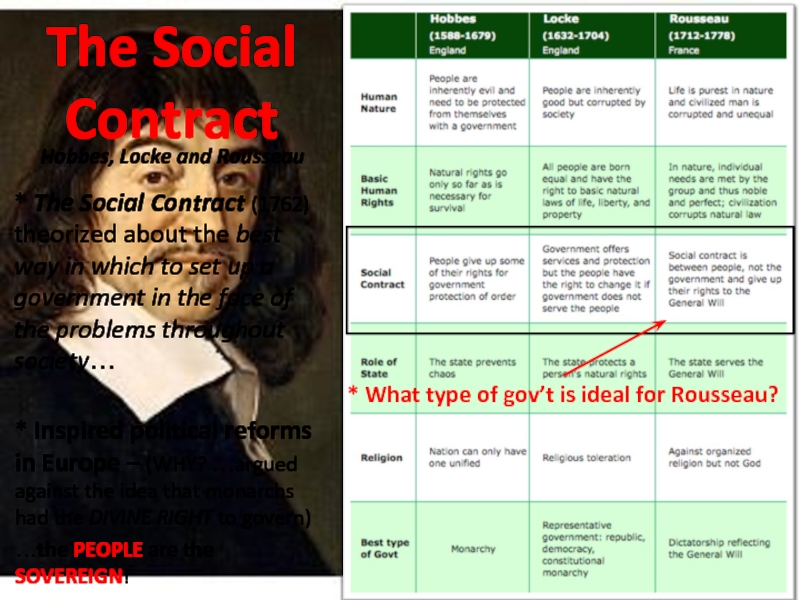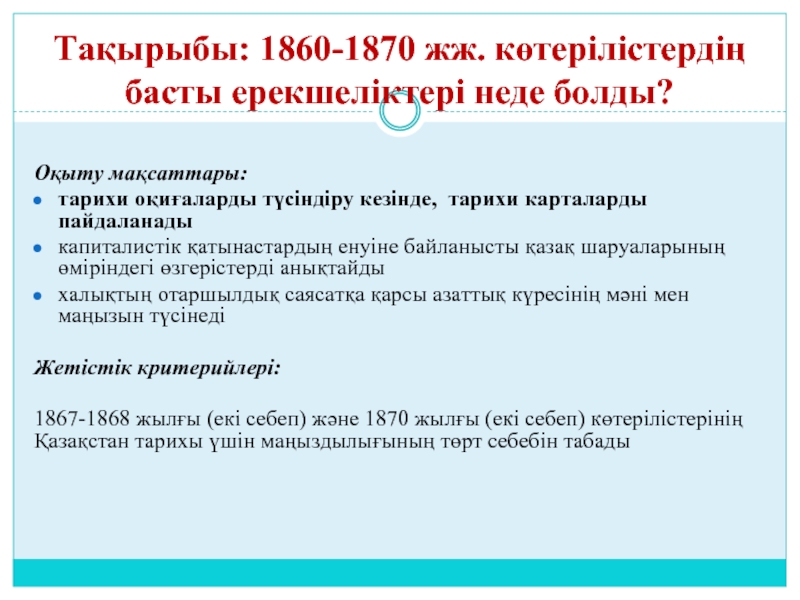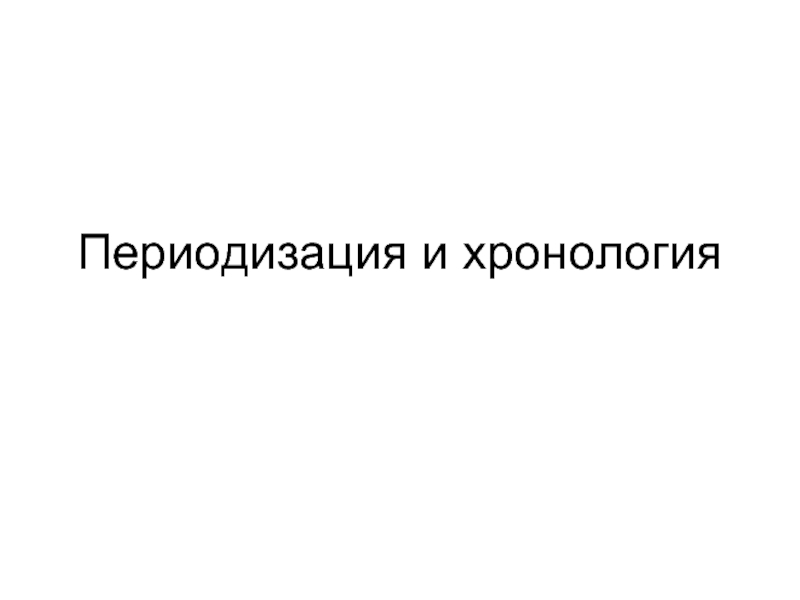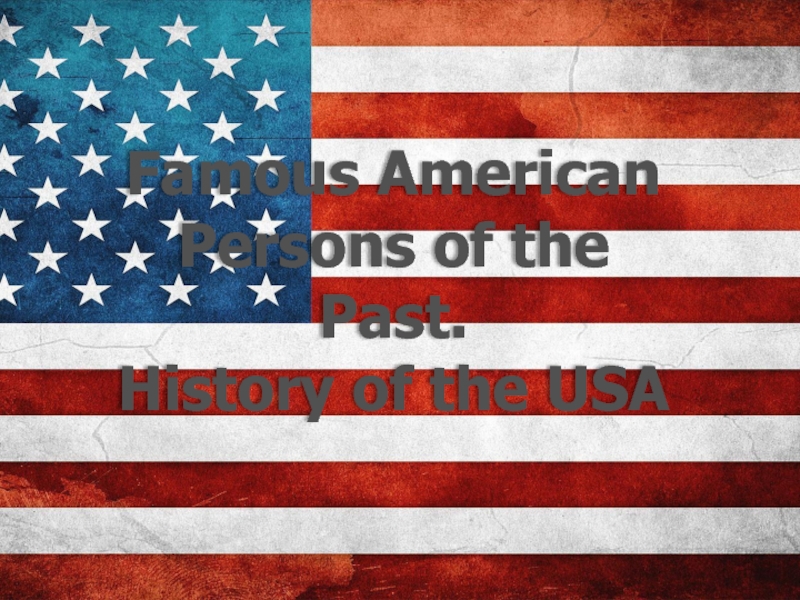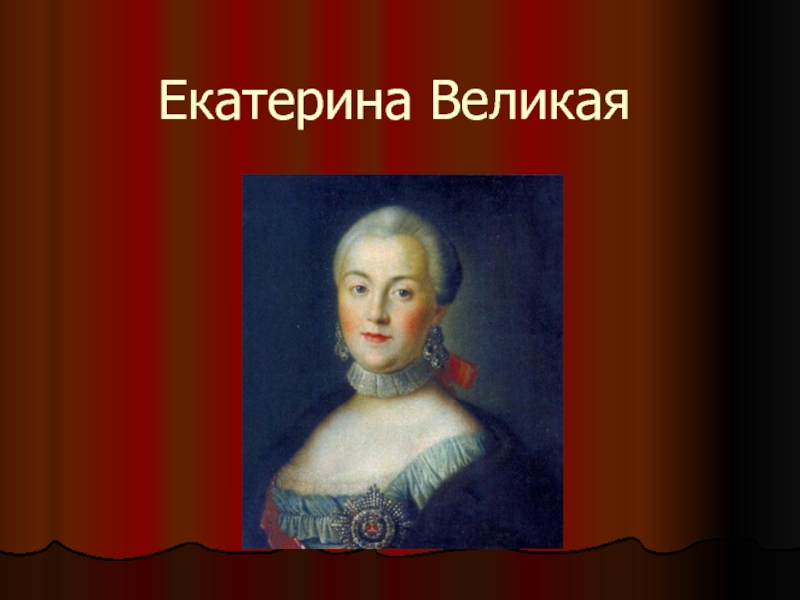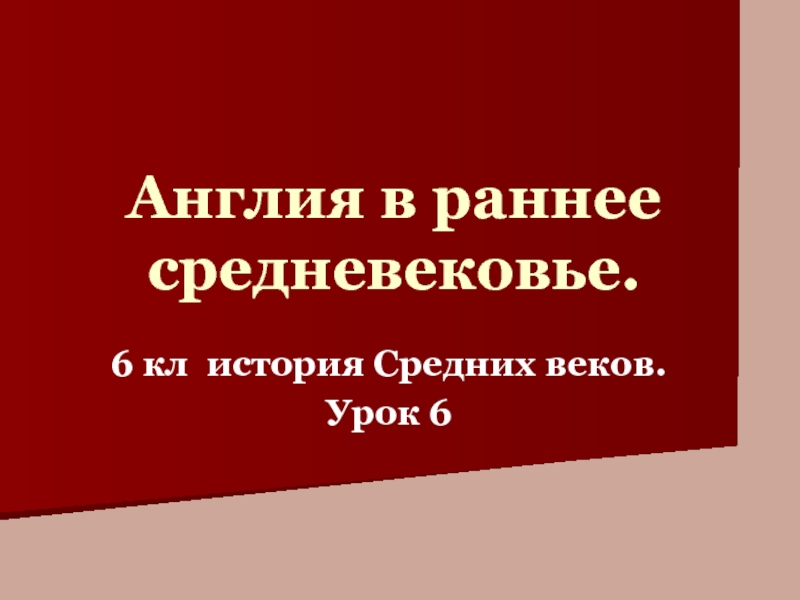- Главная
- Разное
- Дизайн
- Бизнес и предпринимательство
- Аналитика
- Образование
- Развлечения
- Красота и здоровье
- Финансы
- Государство
- Путешествия
- Спорт
- Недвижимость
- Армия
- Графика
- Культурология
- Еда и кулинария
- Лингвистика
- Английский язык
- Астрономия
- Алгебра
- Биология
- География
- Детские презентации
- Информатика
- История
- Литература
- Маркетинг
- Математика
- Медицина
- Менеджмент
- Музыка
- МХК
- Немецкий язык
- ОБЖ
- Обществознание
- Окружающий мир
- Педагогика
- Русский язык
- Технология
- Физика
- Философия
- Химия
- Шаблоны, картинки для презентаций
- Экология
- Экономика
- Юриспруденция
The enlightenment. The age of reason. Political theorists презентация
Содержание
- 1. The enlightenment. The age of reason. Political theorists
- 2. POLITICAL THEORISTS Applying the scientific method to
- 3. * MAIN IDEA: scientists came to believe
- 4. René Descartes and Rationalism * 17th
- 5. Thomas Hobbes and John Locke * HOBBES
- 6. The State of Nature; Hobbes and
- 7. Purpose of Government; Hobbes and Locke *
- 8. Gov’t and Representation; Hobbes and Locke *
- 9. Impact on Founding Fathers; Hobbes and Locke
- 10. The Role of Philosophy Philosophers (philosophes) and
- 11. The Spread of New Ideas …during the
- 12. The Spread of New Ideas Parisian Salons
- 13. The Spread of New Ideas Parisian Salons
- 14. John Locke Tabula Rasa * Francis Bacon,
- 15. John Locke Tabula Rasa * Why is
- 16. John Locke Natural Rights * Two Treatises
- 17. 1.) LIFE (and health): everyone is entitled
- 18. Baron de Montesquieu Basic Types of Government
- 19. Montesquieu Separation of Powers * DESPOTISM could
- 20. Voltaire Religion and Deism * Francois-Marie Arouet
- 21. Voltaire Religion and Deism * Throughout his
- 22. Voltaire “Those who can make you believe
- 23. Denis Diderot The Encyclopedia * Think back
- 24. Denis Diderot The Encyclopedia * The Encyclopédie
- 25. Denis Diderot The Encyclopedia * QUESTION: How
- 26. Cesare Beccaria Justice and the Law *
- 27. Adam Smith Economics and the Physiocrats 1.)
- 28. WHY should individuals be free to pursue
- 29. Adam Smith The Wealth of Nations *
- 30. Jean-Jacques Rousseau Human Development * Emile (1762)
- 31. The Social Contract Hobbes, Locke and Rousseau
- 32. Mary Wollstonecraft Women’s Rights * A Vindication
Слайд 2POLITICAL THEORISTS
Applying the scientific method to their PHYSICAL WORLD, Enlightenment thinkers,
Слайд 3* MAIN IDEA: scientists came to believe that REASON is main
René Descartes and Rationalism
* NEW views of the universe, earth and astronomy influence NEW views of HUMANS and SOCIETY…
* The ENLIGHTENMENT focused on the use of REASON!
Слайд 4René Descartes and Rationalism
* 17th century French philosopher who focused on
* In Discourse on Method (1637), he stated that he would only accept those things his REASON said were true.
* Second Principle: “the mind cannot be doubted but the body and material world can, the two must be radically different” (the separation of mind and matter/body)
René Descartes – The Father of Modern Rationalism
* First Principle: “I think, therefore I am” (focused on his own mind)
Слайд 5Thomas Hobbes and John Locke
* HOBBES – English philosopher who was
* LOCKE – English philosopher who was best known for his book Two Treatises on Government (1689) – argued against ABSOLUTE RULE!
* BOTH were post-English Revolution PHILOSOPHERS who were particularly concerned with three different topics:
1.) MAN (humans) in their STATE of NATURE
2.) What is the PURPOSE of GOVERNMENT?
3.) How should government REPRESENT the PEOPLE?
* BOTH had a HUGE influence on the American FOUNDING FATHERS!
* How does society deal with the problem of DISORDER and CHAOS? – structure of gov’t, human nature…
Слайд 6The State of Nature;
Hobbes and Locke
* The STATE OF NATURE
Слайд 7Purpose of Government; Hobbes and Locke
* Both LOCKE and HOBBES had
Слайд 8Gov’t and Representation; Hobbes and Locke
* What does CONSENT OF THE
…a government’s use of power is justified and can only be legitimate if the PEOPLE give their consent to be governed!
Слайд 10The Role of Philosophy
Philosophers (philosophes) and The Enlightenment
* Philosopher: intellectual who
* WHO were the philosophers of the Enlightenment?
…intellectuals, nobility, middle-class, European, mostly French!
* Philosophers wanted to study society and apply rational criticism to it in order to make it better and improve human conditions! *
Слайд 11The Spread of New Ideas
…during the Enlightenment
* These philosophes spent a
* Philosophes spread new ideas in a variety of ways (some new, some old):
1.) The BOOK industry (developments in tech. and literacy rates)
2.) SCIENTIFIC and LITERARY magazines (new sources of knowledge)
3.) Parisian SALONS (in the public sphere)
4.) London COFFEE HOUSES (“penny universities” in the public sphere)
Слайд 12The Spread of New Ideas
Parisian Salons and London Coffee Houses
* BOTH
* People came together to discuss Enlightenment ideas and have conversations WITHOUT REGARD TO RANK!
Слайд 13The Spread of New Ideas
Parisian Salons and London Coffee Houses
* Women
* Women were the CREATORS and LEADERS of the Parisian Salons!
* Place for like-minded scholars to congregate, read, learn from and debate with one another!
* In the hands of the SALONNIÈRES (hostesses), who had the power to choose guests and deny entry!
Слайд 14John Locke
Tabula Rasa
* Francis Bacon, during the Scientific Revolution of the
* John Locke – in his Essay Concerning Human Understanding (1690) – restated the importance of the experience of the senses!
…and sets out the case that the human mind at birth is a complete, but receptive, blank slate (tabula rasa) upon which experience imprints knowledge.
* TABULA RASA – the mind is a blank slate at birth filled through experiences from the outside world!
Слайд 15John Locke
Tabula Rasa
* Why is this important to the Enlightenment?
…It
Слайд 16John Locke
Natural Rights
* Two Treatises of Government (1689)
* Two separate
“Reason… teaches all Mankind, who would but consult it, that being all equal and independent, no one ought to harm another in his Life, Health, Liberty, or Possessions.”
Слайд 171.) LIFE (and health): everyone is entitled to live once they
John Locke
Natural Rights
2.) LIBERTY: all humans are entitled to do anything they want so long as it doesn't conflict with anyone else’s natural rights.
3.) PROPERTY: all humans are entitled to own all they create or gain through gift or trade so long as it doesn't conflict with anyone else’s natural rights.
* What are Locke’s NATURAL RIGHTS?
* QUESTON: Why does Locke feel government is established?
* QUESTION: What did Locke feel the people had a right to do if government did not protect the natural rights of its people?
Слайд 18Baron de Montesquieu
Basic Types of Government
* The Spirit of the Laws
* States that there are THREE different types of governments:
1.) REPUBLICS (democracies, aristocracies)
2.) MONARCHIES (fixed and established laws)
3.) DESPOTISMS (single person – TYRANT)
Слайд 19Montesquieu
Separation of Powers
* DESPOTISM could be prevented by a system of
MAKES LAWS!
ENFORCES LAWS!
INTERPRETS LAWS!
Слайд 20Voltaire
Religion and Deism
* Francois-Marie Arouet – Voltaire – outspoken French philosopher
* Fought a lifelong struggle for equal justice, religious tolerance, the use of reason and freedom of speech
…attacked injustice among nobility, government and the CATHOLIC CHURCH through the use of SATIRE!
…was exiled to England for two years.
… attacked religious DOGMA and ignorance throughout society.
Слайд 21Voltaire
Religion and Deism
* Throughout his life, VOLTAIRE fought and advocated for
1.) Deism was an 18th century religious philosophy that focused on REASON and NATURAL LAW
2.) …built on Isaac Newton’s WORLD-MACHINE concept
3.) GOD created the universe… set it in motion… then stepped back and let it run on its own!
* Why would Voltaire be an advocate of DEISM?
Слайд 22Voltaire
“Those who can make you believe absurdities can make you commit
Voltaire’s words reflected his observations on history and foreshadowed atrocities yet to come in Europe (particularly France). Outspoken against tyranny, ignorance, religious intolerance and the excesses of the Church, Voltaire never held his tongue, even in the face of threats.
Forced to choose between exile and imprisonment after insulting a powerful French nobleman, Voltaire chose exile in England. While there, he befriended Jonathan Swift and Alexander Pope and was influenced by John Locke and Isaac Newton. He returned home to France more radical than ever, and his ideas influenced the American and French revolutions.
* QUESTION: What ‘absurdities’ have been accepted as ‘common knowledge’ throughout the modern world AND/OR during the SCI. REV. and Enlightenment?
Слайд 23Denis Diderot
The Encyclopedia
* Think back to the discussion we had on
* Denis Diderot was a French philosopher (18th century) who wanted to “incorporate all of the world's knowledge and hoped to spread the information to the public and future generations”
…founder, chief editor and contributor to the Encyclopédie
* According to Diderot, the compilation was a “change to the ordinary way of thinking”
Слайд 24Denis Diderot
The Encyclopedia
* The Encyclopédie was a LIFE-LONG work of Diderot
* Articles written by greatest thinkers, philosophers and scientists of the day – they included:
2.) Social, legal and political reforms
1.) Attacks on religious superstition
3.) Supported tolerance
4.) New ideas about art, science and government
* Rousseau, Diderot and Montesquieu were notable contributors *
Слайд 25Denis Diderot
The Encyclopedia
* QUESTION: How do you think the Church and
ANSWER – They opposed it heavily and tried to stop its publication and distribution throughout France!
Слайд 26Cesare Beccaria
Justice and the Law
* Cesare Beccaria, Italian philosopher and politician
* In On Crimes and Punishments, Beccaria argued:
1.) Punishment should NOT be excessive – SHOULD be proportionate to the crime
2.) The death penalty does NOT deter crime – the STATE does not have the right to take lives
4.) …for overall reform of the legal system
3.) Procedures of criminal convictions and punishments should be PUBLIC and PROMPT
* By 18th century, European states had developed BRUTAL justice system to deal with inadequate policing powers… (PUNISH and PREVENT)
Слайд 27Adam Smith
Economics and the Physiocrats
1.) The PHYSIOCRATS were a group of
2.) Adam Smith was a Scottish economist who is most well-known for writing AN INQUIRY INTO THE CAUSE OF THE WEALTH OF NATIONS (1776 – The Wealth of Nations)
* French Physiocrats AND Adam Smith acted as the founders of modern economics as they maintained that:
“individuals should be free to pursue their own economic self-interest – which would benefit society as a whole!”
Слайд 28WHY should individuals be free to pursue their own economic self-interest?
* Because, according to Smith:
1.) The desire for personal gain drives economic activity, which leads to competition…
2.) And competition would benefit economy as a whole…
(competition keeps prices lower, makes production more efficient, labor and capital are directed to profitable industries)
3.) THUS, individuals who pursue their own economic self-interests ultimately benefit society!
* This free-market system, was known to the PHYSIOCRATS and ADAM SMITH as LAISSEZ-FAIRE economics (French for “to let do”)
* The government would NOT interrupt the FREE-MARKET through regulations and restrictions!
Слайд 29Adam Smith
The Wealth of Nations
* In The Wealth of Nations, Smith
* The Government should only play three roles…
1.) Protect society from outside invasion – the ARMY
2.) Defend citizens from injustice and harm – the POLICE
3.) Keep up public works that private individuals could not afford – the NECESSITIES
Слайд 30Jean-Jacques Rousseau
Human Development
* Emile (1762) – a TREATISE/novel on the education
* In Emile, he argued:
1.) EMOTION and REASON were important to human development – sought a balance between emotion and reason
2.) Women are naturally different from men (educate women for roles as wives and mothers) – learn obedience and the skills necessary to provide loving care for husbands and children…
education should FOSTER human development!
Слайд 31The Social Contract
Hobbes, Locke and Rousseau
* The Social Contract (1762) theorized
* Inspired political reforms in Europe – (WHY? …argued against the idea that monarchs had the DIVINE RIGHT to govern)
…the PEOPLE are the SOVEREIGN!
* What type of gov’t is ideal for Rousseau?
Слайд 32Mary Wollstonecraft
Women’s Rights
* A Vindication of the Rights of Woman (1792)
1.) Men arbitrarily ruling women was similar to gov’t arbitrarily ruling people – both are wrong!
2.) Humans have ability to reason… women are humans… women should have the same rights as men!
3.) Women are NOT naturally inferior to men!
